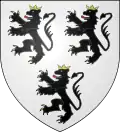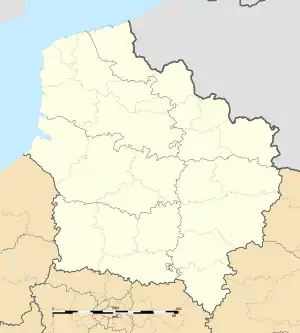Halluin | |
|---|---|
 Mont d'Halluin district | |
 Coat of arms | |
Location of Halluin | |
 Halluin  Halluin | |
| Coordinates: 50°47′01″N 3°07′32″E / 50.7836°N 3.1256°E | |
| Country | France |
| Region | Hauts-de-France |
| Department | Nord |
| Arrondissement | Lille |
| Canton | Tourcoing-1 |
| Intercommunality | Métropole Européenne de Lille |
| Government | |
| • Mayor (2021–2026) | Jean-Christophe Destailleur[1] |
| Area 1 | 12.56 km2 (4.85 sq mi) |
| Population | 20,829 |
| • Density | 1,700/km2 (4,300/sq mi) |
| Time zone | UTC+01:00 (CET) |
| • Summer (DST) | UTC+02:00 (CEST) |
| INSEE/Postal code | 59279 /59250 |
| 1 French Land Register data, which excludes lakes, ponds, glaciers > 1 km2 (0.386 sq mi or 247 acres) and river estuaries. | |
Halluin (French pronunciation: [alɥɛ̃]; Dutch: Halewijn) is a commune in the Nord department in northern France.[3]
Geography
It is located at the north of the Métropole Européenne de Lille, on the Belgian border, contiguous with the Belgian town of Menen.
History
The family of Halluin is mentioned as early as the 13th century. In 1587 the title of duke and peer of the realm was granted to it, but in the succeeding century it became extinct.[4]
Population
|
| ||||||||||||||||||||||||||||||||||||||||||||||||||||||||||||||||||||||||||||||||||||||||||||||||||||||||||||||||||
| Source: EHESS[5] and INSEE (1968-2017)[6] | |||||||||||||||||||||||||||||||||||||||||||||||||||||||||||||||||||||||||||||||||||||||||||||||||||||||||||||||||||
Transport
The Halluin railway station, closed in the 1970s, was situated on the Somain-Halluin Railway. The town is now served by buses of Ilévia.
The A22 autoroute links the town to Lille and Belgium.
Heraldry
 Arms of Halluin |
The arms of Halluin are blazoned : Argent, 3 lions sable langued gules, armed and crowned Or.
|
Politics
An erstwhile bastion of the left, Halluin owes its nickname Halluin the Red to the powerful trade unions who used their influence to support Communist mayors during the interwar period. However, since the 1990s Halluin has become gentrified (see also below), and in the 2007 and 2012 presidential elections the town backed Nicolas Sarkozy.
In the 2014 mayoral elections, 62% of voters chose right-wing parties: Gustave Dassonville (UMP) received 40% of the votes and Jean‑Christophe Destailleur (Centre-right) received 22% of the votes. Left-wing parties, with 38% of the votes, were defeated, and Gustave Dassonville was elected.[7] Six years later, in 2020, Jean‑Christophe Destailleur (Centre-right) was elected mayor of Halluin.
Despite the noted gentrification of Halluin, the neighbouring town of Menen, Belgium, situated within walking distance of central Halluin, underwent a simultaneous radicalization, given the municipality's attempts to ban its employees from speaking French to Francophone people whose command of Dutch may be limited, and to use sign language instead. While some townsfolk of Halluin's adjoining conurbation may have regarded this as a brave attempt to enforce Flemish supremacy over Francophone neighbours, others, including Francophone neighbours themselves, and international observers may have regarded such a measure as allegedly fanatical and insensitive to the needs of Francophone neighbours with limited command of Dutch. International press comment was provoked by these municipal regulations.[8]
Points of interest
Twin towns
Halluin is twinned with:
See also
References
- ↑ "Répertoire national des élus: les maires" (in French). data.gouv.fr, Plateforme ouverte des données publiques françaises. 4 May 2022.
- ↑ "Populations légales 2021". The National Institute of Statistics and Economic Studies. 28 December 2023.
- ↑ INSEE commune file
- ↑ One or more of the preceding sentences incorporates text from a publication now in the public domain: Chisholm, Hugh, ed. (1911). "Halluin". Encyclopædia Britannica. Vol. 12 (11th ed.). Cambridge University Press. p. 863.
- ↑ Des villages de Cassini aux communes d'aujourd'hui: Commune data sheet Halluin, EHESS (in French).
- ↑ Population en historique depuis 1968, INSEE
- ↑ 2014 Municipal election Halluin (Newspaper Le Monde)
- ↑ "Français interdit: Belgian town of Menen bans the use of French". Independent.co.uk. 5 September 2013.
External links
- What happens to a border, if the river changes course ? 'Tim Traveller' in YouTube
- Halluin official website (in French)
- 100% Halluin (in French)
- Halluin Tawhid Masjeed official website (in French)
